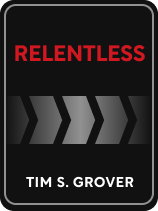

This article is an excerpt from the Shortform book guide to "Relentless" by Tim Grover. Shortform has the world's best summaries and analyses of books you should be reading.
Like this article? Sign up for a free trial here .
What is the difference between good and great people? How do they handle pressure and fears differently?
In essence, good people are rarely ever relentless, whereas great people can be relentless, but only under certain conditions. In Relentless, Tim Grover defines people into three categories by how they act: the “Good,” the “Great,” and the “Unstoppable.”
In this article, we’ll look at the first two categories of people, the Good and the Great, and discover the differences between them.
Defining the “Good”
First, we’ll define what it means to be “Good” to define the difference between good and great. The Good, according to Grover, are rarely or never relentless due to a fear of failure. This fear prevents the Good from fully committing to a task—therefore preventing them from relentlessly pursuing success. Because of this, they can be good at what they do but will never be the best or even great.
(Shortform note: Seth Godin (Purple Cow) agrees with Grover that fear of failure prevents success, and offers further explanation as to why this happens. Godin argues that being afraid will hold you back from taking risks—which is essential for success because it helps you stand out from everyone else who’s playing it safe. This makes other people more likely to remember you and offer you opportunities. Therefore, since fear of failure prevents risks it also prevents success.)
Grover offers two ways that fear of failure and lack of commitment prevent the Good from succeeding.
1. The Good Can’t Take Initiative
Fear of failure makes the Good unable to take initiative—even when they know exactly what they should do—because they fear making a mistake if they do. Instead of taking initiative, the Good tend towards two behaviors:
- Providing support: Because they are followers, the Good focus on helping and encouraging others to succeed above themselves. This way, they can still be a part of the team without having to step up and face their fear of taking charge.
Mediating conflict: The Good will avoid taking sides when a conflict arises because they are afraid of being wrong. Instead, they’ll try to work with both sides to mediate.
2. The Good Freeze Up Under Pressure
Grover explains that fear of failure also makes the Good freeze up under pressure. Pressure causes the Good to focus on the possibility of failure instead of on what they’re trying to accomplish—in other words, they’ll freeze up because they overthink what they’re doing.
For example, a Good dancer is in a competition. They’ve practiced extensively, and have natural talent. However, once they’re about to start, they worry they won’t be able to pull off the backflip at the end of their routine. They try to remember all of the advice their teachers, mentors, and peers gave them about backflips. Now they have a ton of information and self-doubt in their mind taking their focus away from the actual dancing, and their performance suffers.
Defining the “Great”
One step above the Good, there are the Great—people whom Grover says can be relentless under specific circumstances, which is the biggest difference between good and great people. While the Great have more control over their fears and self-doubts than the Good, these fears still plague them from time to time. Grover says that the Great attempt to compensate for their fears with two different methods.
1. Extensive Preparation
The Great can be relentless, but only in specific situations they have prepared for extensively. This preparation gives the Great a clear planned approach to the situation, which allows them to avoid overthinking and commit their focus to success. However, if circumstances unexpectedly change, creating a situation that the Great hasn’t prepared for, they’ll experience the same self-doubts and fears that the Good have and freeze up. This is why the Great can only be relentless sometimes—their confidence is situational.
For example, the difference between the Good musician and the Great musician is that the Great doesn’t overthink or freeze up as long as they’ve spent a long time studying the specific pieces they’ll play. However, during a performance the musician loses their place, their confidence shatters, and they freeze up.
(Shortform note: Sian Beilock (Choke) explains the science behind why unfamiliar situations cause you to freeze up. When you’re faced with a situation you know well, you experience stimulation in the portions of your brain responsible for the actions associated with that situation. However, in an unfamiliar situation, those parts of the brain aren’t as active because your brain doesn’t have associated actions, and therefore, you can’t respond as quickly. Since the Great only plan for specific situations, it follows that their brains can only respond with immediate action to those specific circumstances.)
2. Recognition From Others
Grover argues that while the Great has more confidence than the Good, the Great still has inconsistent confidence, which means they crave recognition—they try to ward off their fear and self-doubt by having others acknowledge their successes. However, other people can’t get rid of the Great’s insecurities; truly doing so requires developing Unstoppable confidence and focus.

———End of Preview———
Like what you just read? Read the rest of the world's best book summary and analysis of Tim Grover's "Relentless" at Shortform .
Here's what you'll find in our full Relentless summary :
- The qualities you’ll need to become the best in your field
- Why sacrifices and discomfort are necessary for growth
- Why you should practice indulging in your primal self






